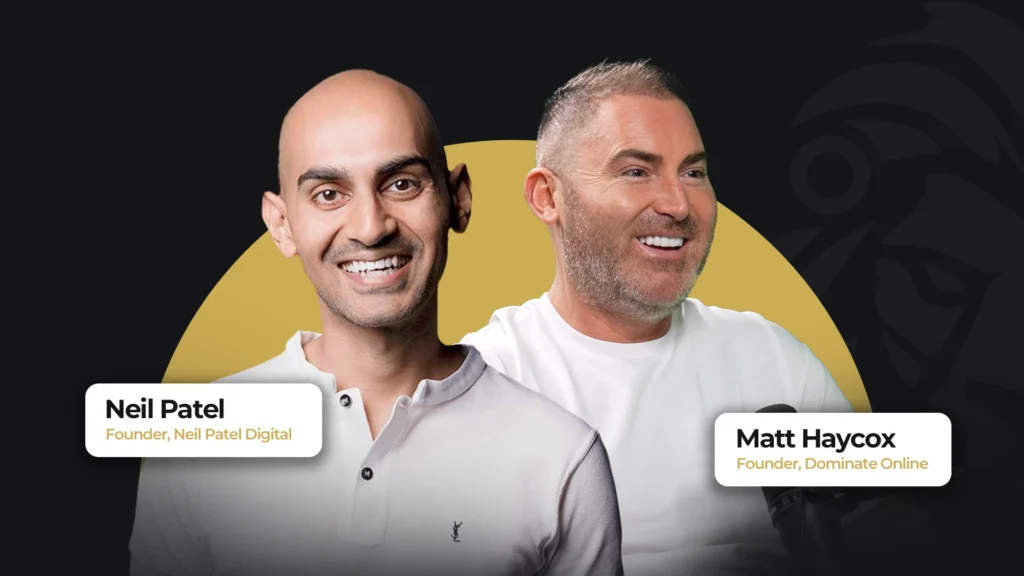Search Engine Optimisation (SEO) is evolving faster than ever, and businesses must adapt to remain competitive. Recently, marketing expert Neil Patel discussed key strategies and insights about SEO, AI, and the changing digital landscape.
This text has been generated from a podcast Matt Haycox conducted 7 days ago (25.06. 2025) with Neil Patel for Matt Haycox’s YouTube channel, Matt Haycox. Here are some essential takeaways from his conversation:
Beyond Google: Embracing Search Everywhere Optimization
Google remains essential, commanding around 13.6 billion daily searches. Yet, focusing solely on Google could mean missing approximately 73% of daily searches happening on other platforms like Instagram, Amazon, ChatGPT, and Apple’s App Store. Patel emphasizes “Search Everywhere Optimization,” encouraging businesses to diversify their strategies beyond traditional search engines.
While Google searches continue to grow, platforms such as Amazon deliver higher transactional value per search. Amazon’s approximately 3.5 billion daily searches are more likely to lead to direct purchases, underscoring the importance of aligning your SEO strategies with user intent across different platforms.
AI and SEO: Finding the Right Balance
The rise of AI-generated content has sparked much debate around content creation quality and effectiveness. Patel conducted an insightful experiment comparing AI-generated articles with human-written content across 68 websites. The results were striking—AI content generated about 5.44 times less organic traffic from Google than human-written content.
This difference stems from Google’s emphasis on E-E-A-T (Experience, Expertise, Authority, and Trust). AI-generated content often struggles to convey genuine experience and authoritative expertise. Patel suggests that the optimal solution involves combining human and AI efforts—what he terms “H-AI”—leveraging AI to support, not replace, human creativity and expertise.
Adapting SEO for AI-driven Searches
AI is also transforming how users search. As platforms like ChatGPT and other large language models integrate what’s known as the Google AI Overview, businesses need to ensure they are discoverable in these summarised responses. Many now turn to platforms like ChatGPT, changing the nature of user queries and interactions. To remain competitive, Patel advocates optimizing for these AI-driven search platforms. Key actions include enhancing brand visibility through reviews, backlinks, consistent brand mentions, and industry awards. In short, doing what has always mattered—just more comprehensively.
Strategic Platform Selection for Small Businesses
Patel advises small businesses with limited budgets to strategically test various platforms initially. This “spaghetti” method—throwing marketing efforts across multiple channels to see what sticks—helps identify where efforts yield the best returns. Once successful channels are identified, businesses should focus budgets accordingly, gradually scaling and expanding.
Why Podcasting Matters
Podcasting, Patel highlights, remains an underrated but influential channel, offering significant reach with less competition compared to blogs and other media. Podcast audiences tend to be affluent, with household incomes averaging around $75,000 annually. This makes podcasting not just a marketing tool but an influential medium shaping opinions, consumer behaviors, and even political outcomes.
Content Promotion Over Creation
Finally, Patel emphasizes the critical importance of not only creating exceptional content but promoting it effectively. With around 4.6 billion pieces of new content produced daily, standing out is increasingly challenging. Patel recommends dedicating more time to promoting unique, high-quality content rather than simply mass-producing generic material.
Conclusion
SEO isn’t dead, but its future requires adaptation to multi-platform strategies, smart use of AI, strategic content promotion, and understanding emerging user behaviors. Businesses that embrace “Search Everywhere Optimization,” strategically integrate AI, and focus on content quality and promotion will thrive in this evolving digital landscape.
